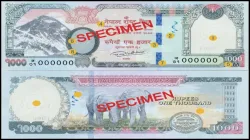Kathmandu: Nepal on Friday announced the printing of a new Rs 100 currency note with a map that shows the controversial territories of Lipulekh, Limpiyadhura and Kalapani, already termed as “artificial enlargement” and “untenable” by India. These regions have been claimed both by Nepal and India for decades, leading to a bitter border row.
“The meeting of the council of ministers chaired by Prime Minister Pushpakamal Dahal ‘Prachanda’ took a decision to print the new map of Nepal, which includes the Lipulekh, Limpiyadhura and Kalapani in the Rs 100 denomination bank notes,” government spokesperson Rekha Sharma told media persons while briefing about the cabinet decision.
“The cabinet approved to re-design the banknote of Rs 100 and replace the old map printed in the background of the bank note during the cabinet meetings held on April 25 and May 2,” Sharma, who is also the Minister for Information and Communication, added. This came after Nepal published a revised map on June 18, 2020, that incorporated three strategically important areas Lipulekh, Kalapani and Limpiyadhura areas by amending its Constitution.
India at the time reacted sharply to the new map, calling it a "unilateral act" and cautioning Kathmandu that such "artificial enlargement" of territorial claims would not be acceptable to it. India said that Nepal's action violated an understanding reached between the two countries to resolve the boundary issues through talks.
India-Nepal border controversy
The issue remained under control until India published a revised political map showing the newly created Union Territories of Jammu and Kashmir and Ladakh in 2019. At that time, India showed Kalapani as part of the Pithoragarh district. This prompted Nepal to exhibit strong protests against New Delhi. Over six months later, Nepal's upper house of the Parliament unanimously passed the Constitution amendment bill providing for the inclusion of the country's new political map in its national emblem.
The India-Nepal bilateral ties came under strain after Defence Minister Rajnath Singh inaugurated an 80-km-long strategically crucial road connecting the Lipulekh pass with Dharchula in Uttarakhand in May 2020. Nepal reacted sharply to the inauguration of the road claiming that it passed through Nepalese territory. India rejected the claim asserting that the road lies completely within its territory. India has sternly asked Nepal not to resort to any "artificial enlargement" of territorial claims.
The bilateral exchanges that had stalled due to the bitter boundary dispute were reset in the later part of 2020 with a series of high-level visits, as New Delhi emphasised that it sees itself as the Himalayan nation's "foremost friend" and development partner. This began with former Foreign Secretary Harsh Vardhan Shringla's maiden visit in November 2020, where he met ex-Nepal PM KP Sharma Oli.
Shringla’s trip followed earlier ones by Indian Army chief Gen. MM Naravane, and a whirlwind tour by Research and Analysis Wing (R&AW) chief Samant Kumar Goel to Kathmandu in a bid to mend ties. Senior BJP leader and the party's head of the foreign affairs department Vijay Chauthaiwale also visited Nepal in early December 2020.
Last year, Nepal lodged a strong protest over a new map published by China that did not include the Lipulekh, Kalapani and Limpiyadhura areas as parts of the Nepali territory and included in the Indian territory. The Nepalese government said it unequivocally believes that the 2020 map must be respected by our neighbours as well as the international community.
(with inputs from PTI)
ALSO READ | Nepal's broadband internet services are disrupted in most parts of country and it has India link I DEETS
Latest World News
